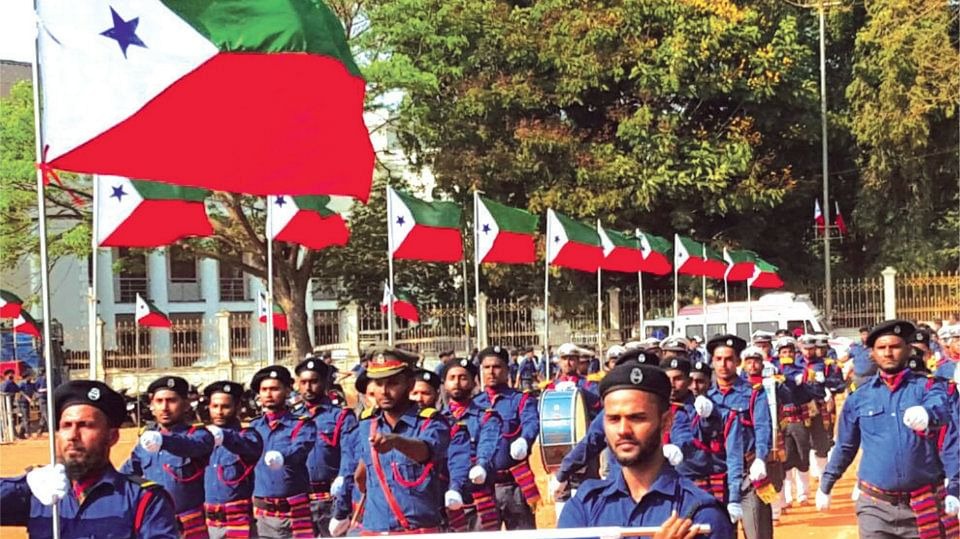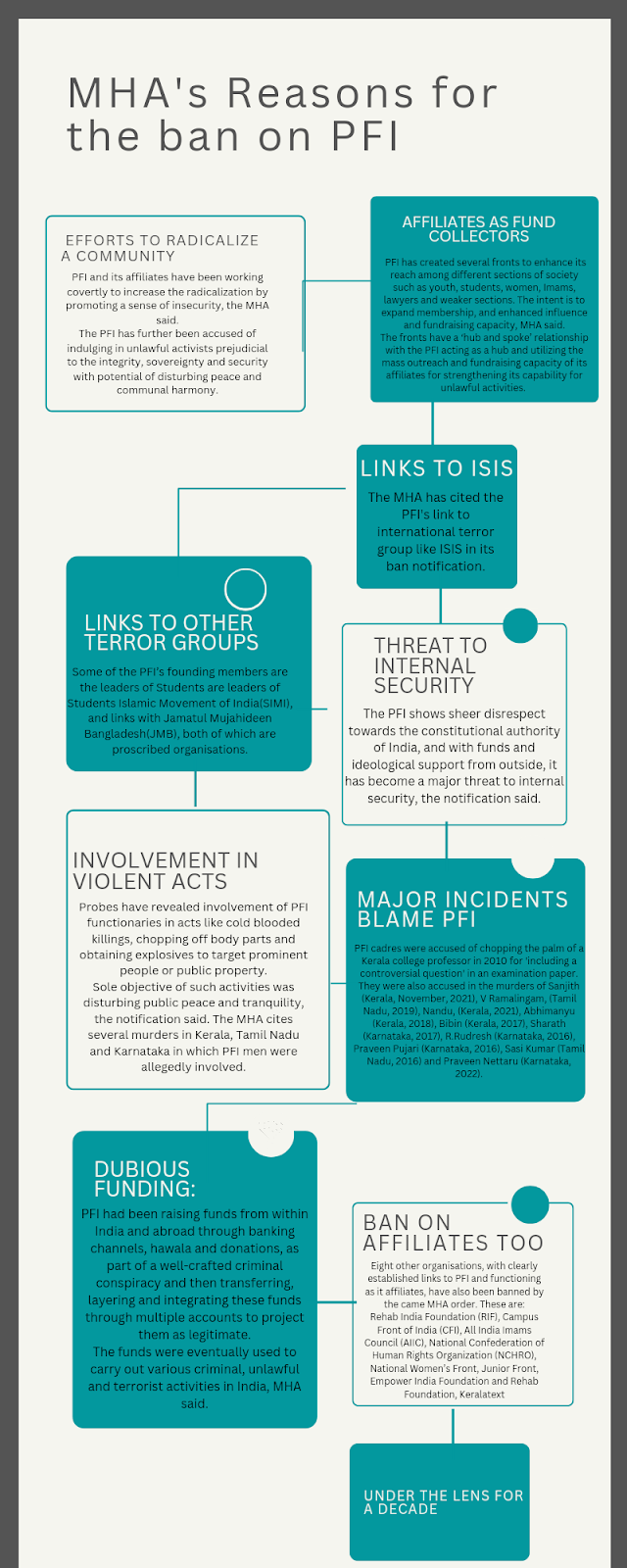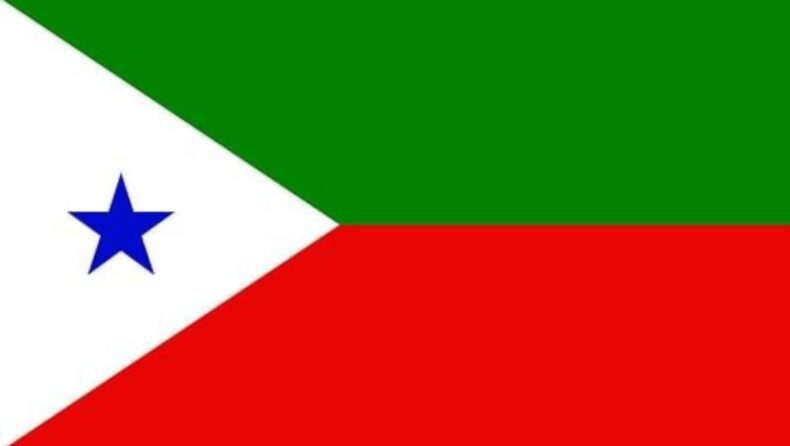Popular Front of India (PFI) dissolves a day after the Centre designated it as an unlawful association.

According to the (UAPA) Unlawful Activities Prevention Act, the Centre deemed PFI and its affiliates to be “unlawful associations,” imposing a 5-year ban on the functioning of these organisations in India.
After the Centre on Wednesday, September 28, banned the group and its affiliated groups as “unlawful,” the extremist Islamic organisation Popular Front of India (PFI) has been dominating the news. This decision was preceded by the National Investigation Agency’s detention of over 100 of the group’s leaders on September 22 from various Indian states. A day later, the PFI declared that it had disbanded the group in compliance with the government’s directive.
Previously, in February 2022, the murder of 2 Bajrang Dal activist Harsha Hindu, 28, within the Shivamogga district caused communal tensions in Karnataka. The PFI and its political arm, the Social Democratic Party of India (SDPI), were openly accused of carrying out the murder in a statement by the Vishwa Hindu Parishad (VHP) and members of other right-wing organisations.
After the murder, there were increased calls to ban the PFI in India.
India and extremist religious activism: A Look at the advent and history of PFI
Popular Front of India is registered in Delhi under the Societies Registration Act XXI of 1860, stating its purpose to establish a classless society which revolves around Freedom, Justice, and Security. An extremist and exclusivist type of Muslim minority politics is practised by the Popular Front of India (PFI), an Indian Muslim political association.
To safeguard the interests of the Muslim minority, Kerala’s contentious National Development Fund (NDF) was established in 1994, two years following the Babri Masjid demolition incident.
Karnataka Forum for Dignity (KFD) and the National Development Front combined to become PFI in 2006. (NDF). An organisation that identifies as a “neo-social force dedicated to empowering people to promote justice, freedom, and security” was identified as the group. Both MNP and KFD were created to advance social causes and issues about minority rights, however, both organisations have occasionally been linked to terrorism.
The PFI gained strength over the following few years as several other organisations, including the Citizen’s Forum in Goa, the Community Social and Educational Society in Rajasthan, the Nagarik Adhikar Suraksha Samiti in West Bengal, the Lilong Social Forum in Manipur, and the Association of Social Justice in Andhra Pradesh, merged with the group.
It expanded its base and relocated its corporate headquarters from Kerala’s Kozhikode to New Delhi. Since its advent, the PFI has been accused of engaging in acts of violence, having access to weapons, and encouraging extremism. But the fact that many of the PFI’s leaders were affiliated with the proscribed Students Islamic Movement of India raised concerns about the organization’s expansion (SIMI).
The PFI has been accused of having ties to SIMI, which the government forbade in 2001 and also has been associated with Indian Mujahideen.The government has filed a number of accusations against the organisation and its members, including “sedition, inciting animosity among various social groups, and taking attempts to destabilise India.”
Several demands to ban the PFI have been made in recent years due to its suspected role in provoking anti-government demonstrations. The Kerala government asserted in 2012 that PFI was “nothing but the resurrected organisation SIMI in another form.”
Yogi Adityanath’s administration in Uttar Pradesh suggested a ban on the PFI in 2020 as the civilian agitation against NRC-CAA grew across the nation, alleging that the group was behind the state’s protests. Keshav Prasad Maurya, the deputy chief minister, described the PFI as the “incarnation” of the outlawed group SIMI.
Explanations cited by the Ministry of Home Affairs (MHA) in the notification declaring PFI an ‘unlawful association:

Banning PFI under UAPA: A look at the provisions in the Indian Constitution
The criteria used to designate an association “unlawful” by the UAPA are important because they specify the severity of the punishment, the organization’s right to bail, as well as other penalties that may be imposed.
PFI was designated as an unlawful affiliation as per Section 3 of the Unlawful Activities (Prevention) Act or the UAPA. The Ministry of Home Affairs issued a notification declaring PFI unlawful on 27 September.
National Confederation of Human Rights Organization (NCHRO), The Rehab India Foundation (RIF), National Women’s Front, June Front, Empower India Foundation, and Rehab Foundation, Campus Front of India (CFI), All India Imams Council (AIIC), Kerala are among the other associated organisations that are subject to the ban.
The Socialist Democratic Party of India (SPPI), the political wing of the PFI, which is not on the list of prohibited organisations, referred to the notification as “a challenge” to democracy.
There are various actions that the government could take. According to Section 7 of the UAPA, the Central government has the authority to identify individuals who have funds that are used or handled for the operations of an unlawful association and issue them with prohibitory orders restricting them from utilising, managing, or handling any funds for the PFI’s operations.
By Section 8, the Centre may give notice to any properties it suspects of being used by or for illegal organisations and take steps to impose restrictions on gatherings and access.
The members of PFI can face different penalties and punishments under the UAPA.
Anyone planning activities or events for the Private Finance Initiative (PFI) may be subject to arrest and fines under section 10 of the UAPA. This includes anyone raising money for the organisation through fundraising campaigns, donations, or other contributions. Anyone who participates in PFI meetings gives the organisation money or solicits donations is subject to prison.
https://www.indiacode.nic.in/handle/123456789/1470
Anyone who prompts, assists, or abets the conduct of illegal activity is subject to a seven-year maximum sentence under Section 13. The same provision stipulates a maximum sentence of five years in jail for any participation in illegal activity.
Anyone who handles, transfers, or administers the organization’s funds under Section 11 of the UAPA is subject to up to three years in prison and a fine. The Center may also demand that the person return the funds. People who use or access any properties that the Center has identified as places being used by or for unlawful organisations under Section 8 are subject to a prison sentence of up to one year under Section 12 of the UAPA.
The Center has the authority to add the PFI to a list of 42 terrorist organisations under Section 35 of the UAPA, though it hasn’t proclaimed so yet.












